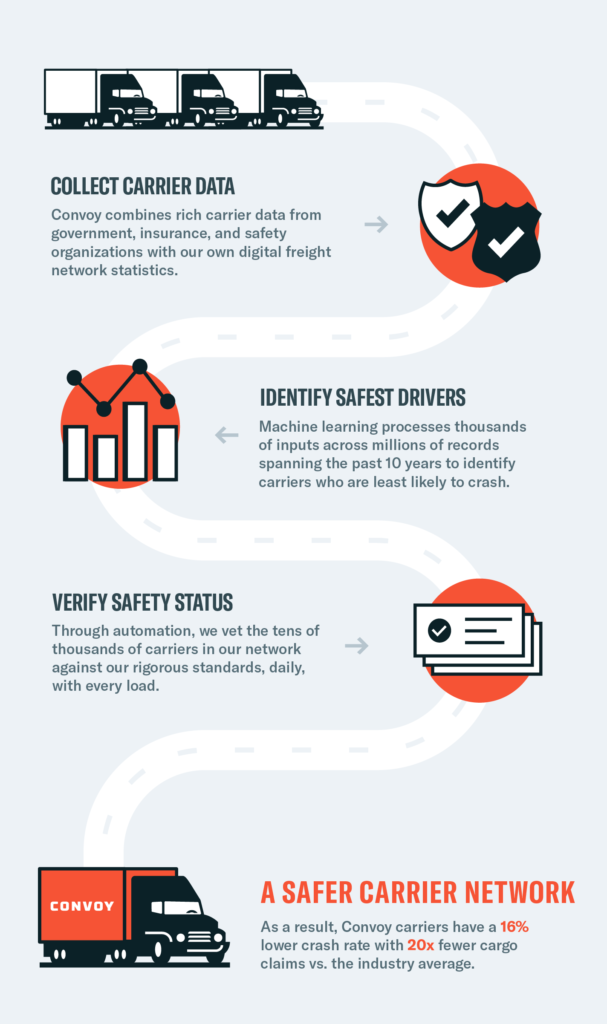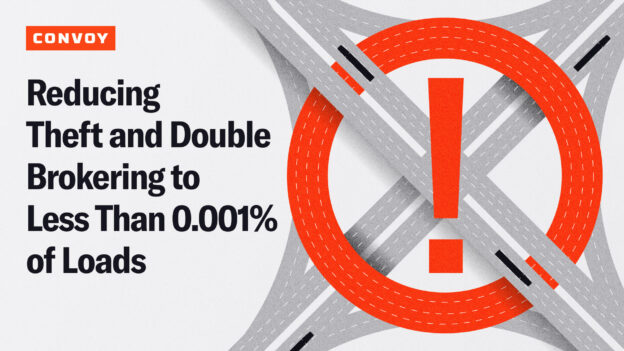Paving the Way to Safer Roads with a Digital Freight Network
Convoy News • Published on June 24, 2020
Today, we announced our new predictive crash capability that uses machine learning and automation to qualify safe drivers into our network, yielding 16% fewer accidents vs. the industry average. This not only helps keep the roads safer, but it also enables us to increase on-time deliveries and cost savings for shippers, with lower claim rates and fewer cargo incidents. Commercial crashes are one of the major contributors to cargo loss, which is estimated to exceed $50 billion globally every year. Today, Convoy experiences a cargo claim less than once per 2,000 loads, whereas the industry experiences a cargo claim about once per 100 loads.
Shippers want access to a network of reliable, safe carriers, and yet obtaining the data, tools, and resources necessary to assess carrier safety has been a traditional problem for brokers, asset-based carriers who broker loads, and freight networks. This problem is only becoming more urgent, as rising insurance premiums and compensatory payments from accidents increase shippers’ financial exposure.
The most widely used carrier safety information comes from the Federal Motor Carrier Safety Administration’s (FMCSA) Carrier Safety and Accountability (CSA) program, which was never designed for private sector use in the carrier selection process, and is not predictive; rather, it was solely intended for reactive intervention by enforcement authorities. The CSA generates overall ratings of Unsatisfactory, Conditional, or Satisfactory; however, 95% of carriers nationally are unrated. Having this many carriers without ratings severely limits visibility into the vast majority of safety records. In addition, the underlying methodology of how these ratings are assigned produces misleading results. For example, to obtain a Satisfactory rating, carriers must go through a full review. The challenge is that only carriers with a considerable number of safety violations qualify for a full review. This means that some carriers with Satisfactory ratings are actually lower-performing and riskier than carriers who are unable to get a full review and thus are not rated. Shippers using CSA ratings to identify safe carriers are relying on a blunt tool at best, and in many cases, are being steered in the opposite direction of safety.
By contrast, we’re solving this problem by using big data, machine learning, and automation, which are hallmarks of a digital freight network. We start by gathering extensive carrier safety and compliance data, and then apply machine learning to predict which carriers are likely to get into accidents. Our algorithm processes thousands of inputs—such as carrier crash history, vehicle maintenance, and speeding and traffic violations—across millions of records spanning the past 10 years, ultimately producing individual scores for the tens of thousands of carriers in our network. We then use automation to analyze compliance with those scores within seconds, every day, with every load to either qualify or disqualify carriers to haul loads. Our model gets smarter over time, driving continuous improvements as more data is generated, providing shippers with increasingly high levels of safe and reliable carriers.

Since our founding in 2015, Convoy has developed machine learning models to automate otherwise manual processes. Last November, we announced raising $400 million to accelerate the development of first-to-market products and technologies focused on improving efficiency in trucking. Today’s announcement is the latest example of progress in this effort, and how a digital freight network can use technology like machine learning and automation to not only efficiently match shippers to carriers, but also to make sure we’re moving full truckload freight in the safest way.
To learn more about our rigorous safety standards, visit Convoy’s quality and compliance page.
If you’re a shipper who is interested in starting to work with Convoy, please contact us, and we’ll be in touch soon.



